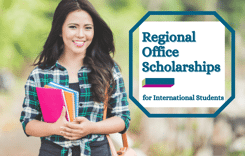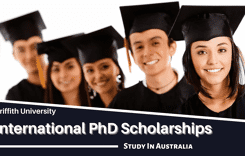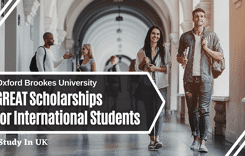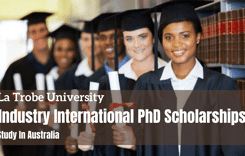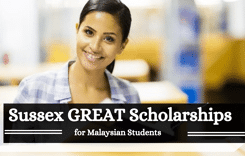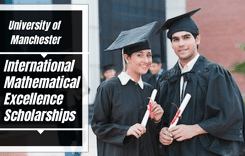The brand-new UNESCO/KeizoObuchi Research Fellowships Programme (UNESCO/JapanYoung Researchers’ Fellowship Programme) is now offered available for scientists of DevelopingCountries This fellowship is used by Government of Japan.
The objective of the fellowships is to support ingenious and creative post-graduate research in 4 locations of advancement of specific interest to UNESCO.
The UNESCO/KeizoObuchi Research Fellowships Programme (UNESCO/JapanYoung Researchers’ Fellowship Programme) moneyed under the Japanese Funds- in-Trustfor the capacity-building of Human Resources will intend, in specific, to effect on capacity-building and research activities in the following locations: 1. Environment(with specific attention on catastrophe threat decrease (DRR); 2.InterculturalDialogue; 3.Information and Communication Technologies; and 4.Peaceful dispute resolution. No other research subjects will be thought about.
ScholarshipDescription:
- ApplicationsDeadline: November30, 2018
- CourseLevel: Fellowships are offered to pursue research.
- StudySubject: Domains of research:
- ScholarshipAward: The Fellowships funded by Japan and administered by UNESCO will include the following:
- Nationality: This fellowship is offered for scientists of Developing Countries.
- Number of Scholarships: The Government of Japan deals 10 fellowships.
-
Scholarship can be taken inIn a couple of countries
It ought to be comprehended that at the end of the Fellowship, the recipient should consent to go back to his/her house nation so that understanding obtained might be put to excellent usage in regional research and training programs.
Eligibilityfor the Scholarship:
EligibleCountries: This fellowship is offered for trainees of Developing Countries:
Afghanistan, Algeria, Angola, Antigua and Barbuda, Argentina, Armenia, Azerbaijan, Bahamas, Bahrain Bangladesh, Barbados, Belarus, Belize, Benin, Bhutan, Bolivia, Bosnia and Herzegovina, Botswana, Brazil, Brunei, Bulgaria, Burkina Faso, Burma, Burundi, Cambodia, Cameroon, Cape Verde, Central African, Republic Chad, Chile, People’s Republic of China, Colombia, Comoros, Democratic Republic of the Congo, Republic of the Congo, Costa Rica, Ivory Coast, Croatia, Djibouti, Dominica, Dominican Republic, Ecuador, Egypt, El Salvador, Equatorial Guinea, Eritrea, Ethiopia, Fiji, Gabon, The Gambia, Georgia, Ghana, Grenada, Guatemala, Guinea, Guinea, Bissau, Guyana, Haiti, Honduras, Hungary, Indonesia, India, Iran, Iraq, Jamaica, Jordan, Kazakhstan, Kenya, Kiribati, Kuwait, Kyrgyzstan, Laos, Latvia, Lebanon, Lesotho, Liberia, Libya, Lithuania, Macedonia, Madagascar, Malawi, Malaysia, Maldives, Mali, Marshall Islands, Mauritania, Mauritius, Mexico, Federated States of Micronesia, Moldova, Mongolia, Montenegro, Morocco, Mozambique, Namibia, Nauru, Nepal, Nicaragua, Niger, Nigeria, Oman, Pakistan, Palau, Panama, Papua New Guinea, Paraguay, Peru, Philippines, Poland, Qatar, Romania, Russia, Rwanda, Saudi Arabia, Samoa, São Tom é and Pr íncipe, Senegal, Serbia, Seychelles, Sierra Leone, Solomon Islands, South Africa, Somalia, Sri Lanka, Saint Kitts and Nevis, Saint Lucia, Saint- Vincent and the Grenadines, South Sudan, Sudan, Suriname, Swaziland, Syria, Tajikistan, Tanzania, Thailand, Timor Leste, Togo, Tonga, Trinidad and Tobago, Tunisia, Turkey, Turkmenistan, Tuvalu, Uganda, Ukraine, United Arab Emirates, Uruguay, Uzbekistan, Vanuatu, Venezuela, Vietnam, Yemen, Zambia and Zimbabwe
EntranceRequirements: Applicants, an optimum of 2 from each using National Commission, should satisfy the following basic requirements:
- * Women candidatures
- * Candidates from least industrialized countries (LDCs) and SIDS
- * African scientists
- * Those who might want pursue their research studies in Japan
ApplicationProcedure:
How to Apply: All applications should be sent with the needed paperwork on the UNESCO Fellowship ApplicationForm Each Member State might choose an optimum of 2 (2) prospects. It is the National Commission’s duty to choose the 2 prospects whose applications it wants to send to UNESCO. The application( s) ought to reach the Section of Participation Programme and Fellowships, UNESCO, 7, Place de Fontenoy 75352 Paris 07 SP prior to 30November 2018 midnight and an advance copy might be sent out by email: s.bantchev-at-unesco. org and l.zas-friz-at-unesco. org.
Theapplication should consist of the following accessories:
( i) The UNESCO Fellowship application type properly finished in replicate. Two current pictures (required) ought to be consisted of with the type.
( ii) Certified copies of degrees or diplomas (consisting of records of grades) in replicate. Proof of having actually gotten a Master’s Degree should be consisted of.
( iii) A recommendation letter from somebody acquainted with the prospect’s work.
( iv) A host institute’s letter of approval (i.e. the institute that has actually accepted the prospect for work ought to she/he be picked for a Fellowship). This letter of approval should show that the host institute verifies its determination to offer the appropriate research centers needed by the prospect in the selected field of expertise.
- Why?The concrete nature of the proposed job’s contribution to the fields noted in paragraph D. 1 above; its ingenious, initial elements; and the scope and function of the research job. The prospect ought to show the factors the theoretical and useful understanding or training obtained at the host organization would be helpful to her/his on-going research job.
- What?The anticipated outcomes or effect of the research job being carried out.
- How?Describe the proposed plans for performing the research.
- Where?The proposed nation where research will be carried out (one to 2 countries optimum) and the name and address of the host institute.
- When?The timeframe clearly specifying the proposed beginning date and the recommended period of research which ought to be of 3 months minimum and 9 months optimum
- How much? An in-depth spending plan quote suggesting the resources needed for the prospect to carry out the proposed research. The quantity ought to be figured out inning accordance with the proposed period and location of research. The quantity ought to not go beyond US$10,000 All figures should be displayed in United States dollars and should be consisted of on a different page. The quantity showed ought to cover, specifically, the global or domestic travel expenses for the authorized travel plan and individual subsistence abroad, and so on (The item of this Programme is to offer research fellowships so it is thought about that in many cases tuition costs will not use). Applicants must be sensible in assembling their proposed spending plans, and think about that approximately US$ 1,000/ US$ 1,800 monthly for lodging and meals (consisting of regional transport and incidentals) ought to not be surpassed. Applications where funds asked for are evaluated to be extreme in relation to the goals and value of the job are most likely to be thought about for a smaller sized grant.

